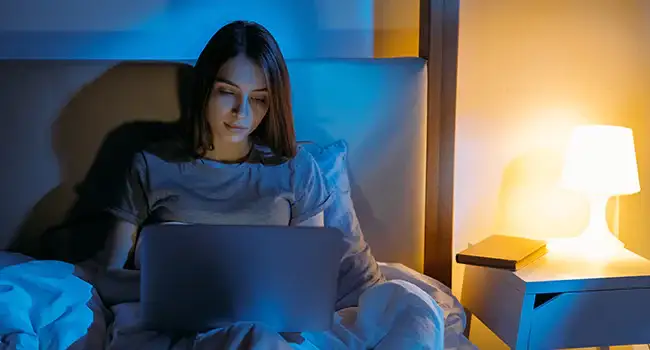One of our fundamental requirements is to bask in the light. It is beneficial for regulating our circadian rhythm, or our natural cycle of awake and sleep, and can increase our energy and mood. However, excessive light at the wrong time might be dangerous. Darkness is specifically required for sleep. The ubiquitous blue light from computers and cell phones can disrupt our normal rhythms and contribute to midday weariness.
There is a growing fear that blue light may have long-term effects on human eye health, even though there isn’t conclusive scientific proof that blue light from digital devices harms your eyes.
What is blue light?
With a wavelength of 400 to 450 nanometers, blue light is a kind of visible light (nm). This form of light is viewed as having a blue color, as the name would imply. Even though the light is seen as white or another color, blue light can still exist. Because blue light has more energy per photon of light than other colors in the visible spectrum, such as green or red light, it is a worry. Because of this, blue light is more likely to harm numerous body cells when absorbed in high enough quantities.
Blue Light and Eye Health
High-energy light from the sun, such as UV and blue rays, can increase your risk of eye damage when exposed in big doses. This has sparked doubts regarding the safety of blue light from digital devices. According to experts, roughly 50% of computer users experience digital eyestrain, often known as computer vision syndrome. Blurred vision, dryness, itchy eyes are common symptoms.
Does blue light cause headaches?
Long-term exposure to blue light can have adverse side effects, such as headaches, neck pain, and eye strain. Digital eye strain—a condition brought on by spending too much time in front of digital screens—is frequently linked to blue light headaches. Our eyes might work overtime when we stare at screens, stressing and straining our eyes.
This may result in vision problems that are not good for eye health, which may cause headaches, eye discomfort, and vision issues. When mainly referring to blue light problems caused by prolonged screen use, digital eye strain is sometimes referred to as computer vision syndrome.
Are there any glasses to protect your eyes from screens?
With so much time spent on digital devices, it’s easy to forget about your eye health. Long periods of screen starring can cause eye strain, redness, blurry vision, and other related issues. Therefore, taking precautions to safeguard your eyes is essential to lowering the likelihood of developing severe additional vision issues. The first step in preventing digital eye strain can be choosing the correct computer glasses. If you must spend much time staring at a computer screen or other screen, wear computer glasses to reduce eye strain.
To safeguard your eyes while using a computer, tablet, or Smartphone, Eyezen lenses and Anti-reflective lenses are indeed computer glasses. You can see your screen more clearly with these computer-specific glasses.
Are blue light glasses good for you?
You’re not alone if you’ve ever experienced dryness and fatigue in your eyes after a long day of staring at a computer screen. It could sound like a smart idea to wear blue light glasses as a remedy. A type of vision eyewear called blue light blocking glasses is constructed with unique lenses that block blue light while allowing other types of light to pass through. By shielding your eyes from high-energy blue wavelengths, blue light glasses reduce the risk of eye injury from extended exposure. It is safe to wear blue light blocking glasses, which won’t harm your vision. Blue light blocking contacts for astigmatism is also beneficial for your eye health.
Blue light health effects
Most people, it may be said, spend a lot of time staring at screens. And that could be harmful to our eyes. Blue light from electronics has been related to issues such as cataracts, macular degeneration, dry eyes, eyestrain, blurred vision, and macular degeneration. Some individuals struggle with sleep. Here we discuss the blue light health effects-
- Blue light’s effects on the cornea:
The first structure light encounters as it travels through the eye is the cornea, which is located at the front of the eyeball. According to certain studies, blue light increases the generation of reactive oxygen species in corneal epithelial cells, whereas Blu-ray irradiation decreases the survival rate of corneal epithelial cells.
- Blue light affects sleep:
Poor sleep is associated with screen use, especially at night. Your circadian rhythm (the cycle during which you go to sleep) is disrupted by the blue light from technological devices. It causes your brain to wake up when it ought to be sleeping. In one study, exposure to blue light at night for as little as two hours reduced or prevented the release of the hormone melatonin, which regulates sleep. Turning off your electronic gadgets at least three hours before night can be beneficial.
- Digital eye strain:
Digital eye strain can result from the blue light from computer screens and other digital gadgets that reduce contrast. Eyestrain can be brought on by drowsiness, dry eyes, poor lighting, or the way you sit in front of the computer. Eyes that are painful or itchy and difficulty focusing are signs of eyestrain. The eye’s retina can be harmed by the blue light that LED lights emit.
Why CFS?
The best eye hospital in India, Centre for Sight, treats various eye conditions and offers personalized solutions to each patient. Our doctors and eye experts are among the best in the industry and highly skilled professionals who treat their patients with the highest sensitivity and care.
Article: Blue Light and Eye Health: What You Should Know!
Author: CFS Editorial Team | Sep 5 2022 | UPDATED 02:37 IST
*The views expressed here are solely those of the author in his private capacity and do not in any way represent the views of Centre for Sight.





